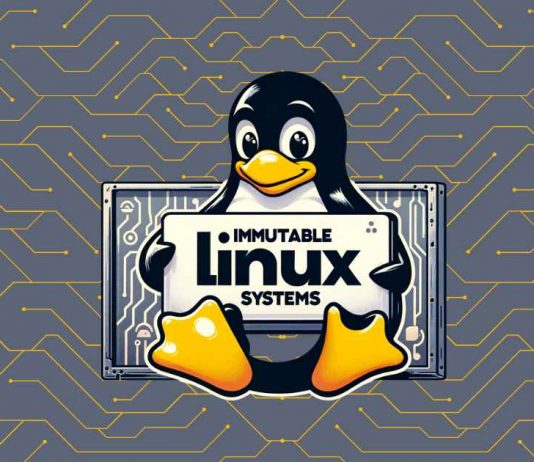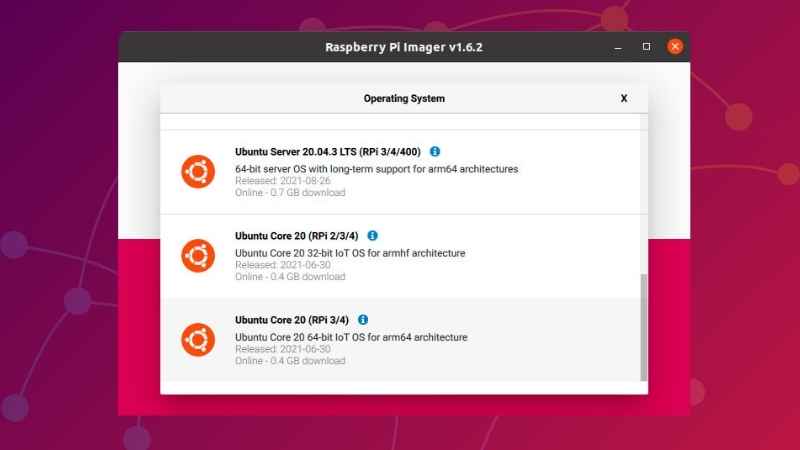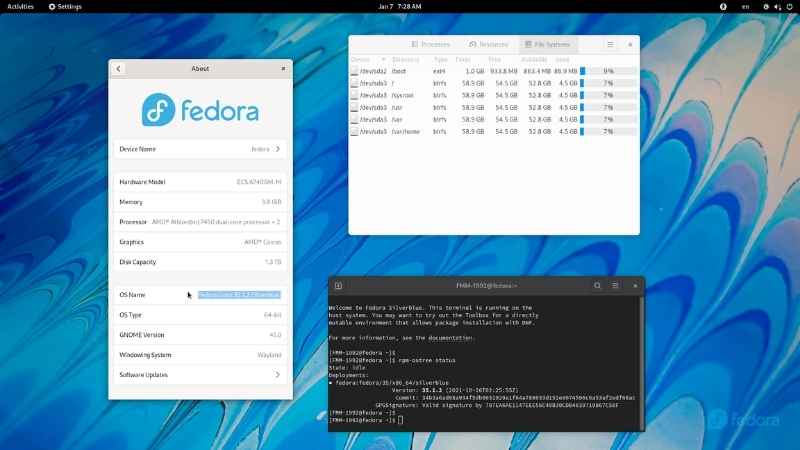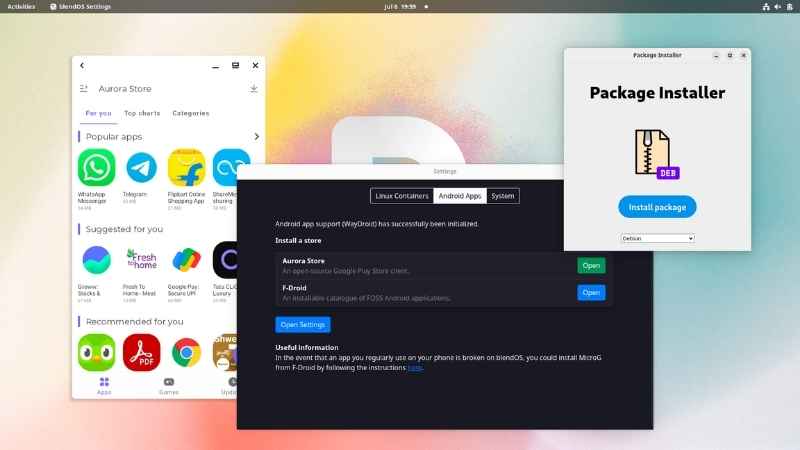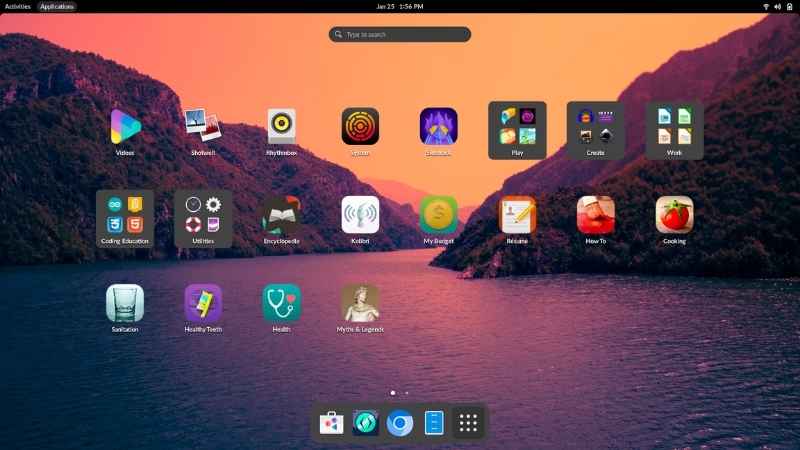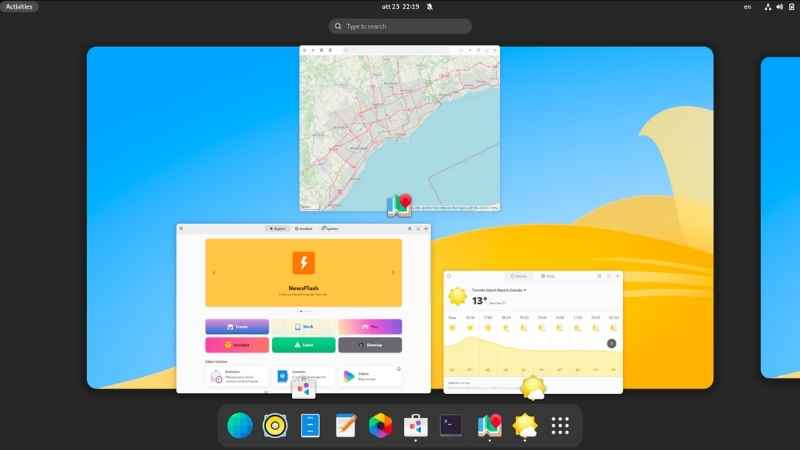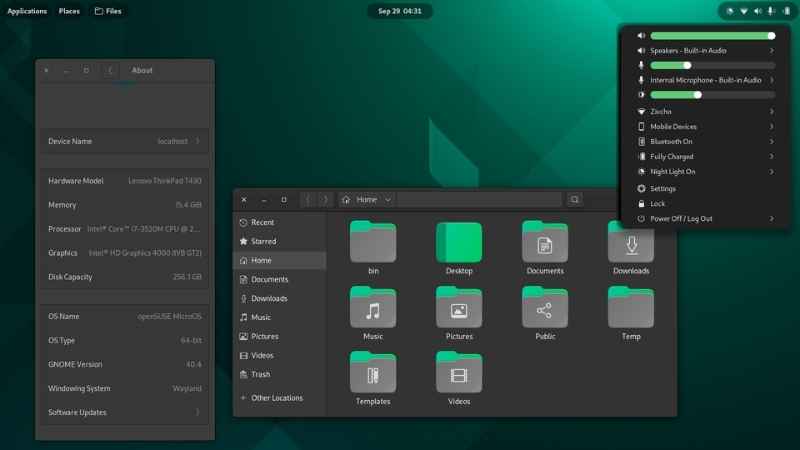A new trend is capturing the attention of tech enthusiasts and professionals alike — immutable Linux systems. This concept, though not entirely new, is gaining traction, especially with Ubuntu, announcing its own immutable version. But what exactly is an immutable system, and why is it becoming increasingly popular?
Contents
What is Immutable Linux Systems?
In an immutable Linux system, the core components of the operating system are set to be read-only. This means that once the system is installed, these elements cannot be altered, either by the user or through external influences like software updates or malware. Some distributions take this a step further by deleting any changes upon system reboot.
While the core system is read-only, users still maintain the ability to perform typical tasks like installing applications, creating, and managing documents. This is usually facilitated through specific directories allocated for user data and applications, which have standard read-write permissions. The separation of the core system and user space ensures that while users can add and modify their data and applications, they cannot alter the fundamental system components.
This concept represents a significant departure from the traditional Linux ethos, which has always been celebrated for its flexibility and user control over the system. The immutable model pivots towards a setup where the most crucial system files don’t require alterations, barring perhaps security updates. Consequently, these parts of Linux are strictly read-only. This shift aims to mitigate issues by restricting user modifications to these critical components.
Pros and Cons of Immutable Linux Systems:
| Advantages of Immutable Linux Systems | Disadvantages of Immutable Linux Systems |
|---|---|
| Enhanced Security: The read-only nature of core system components significantly reduces the risk of unauthorized changes, making the system more resistant to malware and other security threats. | Reduced Flexibility: Users lose the ability to modify core system components, which can be a significant drawback for those who rely on custom configurations or need to tweak system files for specific purposes. |
| Increased Stability: With core components locked, the chances of system crashes or performance issues due to software conflicts or misconfigurations are minimized. | Storage Requirements: Complete image updates, as opposed to incremental file updates, can lead to increased storage requirements over time. |
| Simplified Maintenance: Updating systems becomes more straightforward with complete image updates, ensuring consistency and ease of deployment, especially in networked environments. | Compatibility Issues: Some applications that require modifications to system files may not be compatible with an immutable system, limiting the choice of software. |
| Consistency Across Systems: In environments with multiple machines, such as server farms or cloud-based services, immutable systems ensure that all machines run the same configuration, reducing the complexity of system management. | Learning Curve: Users accustomed to traditional Linux systems may face a learning curve in adapting to the immutable environment, where standard practices like direct system file editing are not possible. |
| Predictable Behavior: The system behaves predictably over time, as changes are not made to the core components, making it easier to manage and troubleshoot. | Limited Customization: The immutable nature of the system limits the extent to which users can customize their operating environment, which can be a drawback for power users. |
Use Cases of Immutable Linux Systems:
1. Better Security and Stability:
A big reason why immutable Linux systems are popular is because they are very secure and stable. In these systems, the main parts of the operating system can’t be changed, which means it’s harder for hackers to do damage. This is really important nowadays when there are a lot of cyber threats. Also, because the main parts of the system don’t change, the system works more reliably.
2. Easier to Take Care Of:
Immutable systems make it easier to look after a lot of computers at the same time. Since everything is based on one main image file, updating and backing up is simpler. This is great for people who have to manage lots of computers and want to save time and effort.
3. Good for Cloud Computing and Containers:
Cloud computing and containers are also reasons why immutable Linux systems are getting more attention. In the cloud, where it’s important for things to work smoothly and reliably, these systems are a solid base. They work really well for container apps, which need a stable and predictable environment.
4. Useful for Developers:
Developers like immutable Linux systems because they are consistent and predictable. This is really helpful when they are making and testing new apps. They can be sure that the operating system won’t change while they are working, which makes testing more accurate.
5. Special Uses and Embedded Systems:
Immutable Linux systems are also being used in special areas and in embedded systems, like in machines or IoT devices. Here, it’s really important for the system to be stable and secure.
6. Meeting Changing Needs:
Lastly, the popularity of these systems shows that what users need and want is changing. As technology gets more complicated, people are starting to like systems that are simple, secure, and don’t need a lot of changes.
Best Immutable Linux Distributions:
The concept of immutability has given rise to a variety of distributions, each offering unique features and capabilities. Whether you’re a developer, a system administrator, or an enthusiast, understanding the nuances of these distributions can help you choose the right fit for your specific needs and projects.
1. Ubuntu Core
Ubuntu Core is a minimal, robust, and secure version of Ubuntu designed specifically for IoT devices and large-scale deployments. It is built around the concept of ‘snaps’ — containerized software packages that are isolated from the underlying system, ensuring security and allowing for easy updates and rollbacks. This makes Ubuntu Core particularly suitable for IoT applications where stability and security are critical. The OS is designed to run on a wide range of devices, from IoT gadgets to cloud containers. Its small footprint and transactional nature make it ideal for secure, scalable, and resilient device deployments. Ubuntu Core is maintained by Canonical, the company behind Ubuntu, ensuring regular updates and professional support.
2. Fedora Silverblue
Fedora Silverblue is an immutable desktop operating system that delivers the familiar GNOME desktop experience. It stands out for its reliable update system, where each version is maintained for approximately 13 months, and updates take effect upon the next reboot, ensuring system consistency. The system updates are atomic, meaning they happen in one go and will not apply if there’s an issue, ensuring you always have a working computer. A previous version of your system is always kept, allowing you to revert if necessary.
Silverblue is developer-friendly, with graphical applications installed via Flatpak, which separates them from the base system and allows fine-grained control over permissions. It also features Toolbx for neatly organizing development tools, ensuring they remain independent from changes to the base system. Fedora Silverblue is private, trusted, and built on open-source technologies, backed by Red Hat. It uses rpm-ostree, a hybrid image/package system, for atomic and safe upgrades with local RPM package layering.
3. Fedora CoreOS
Fedora CoreOS is designed as a minimal, container-optimized operating system, focusing on automatic updates, scalability, and security. It is specifically tailored to run containerized applications, offering an optimal container host. Fedora CoreOS is characterized by its minimalistic design, keeping the base image as lean as possible. Despite its minimal nature, it remains flexible, supporting a wide variety of installation methods. It is available on multiple platforms, with plans for expansion. This OS is ideal for those looking for a secure, scalable solution for container-based workloads.
4. blendOS
blendOS is an innovative operating system that combines the best of Linux distributions, Android apps, and web apps into a seamless experience. It offers native support for Android and Linux apps from various distributions like Debian, Ubuntu, Fedora, Arch Linux, Kali Linux, AlmaLinux, Rocky Linux, and more, providing access to a vast array of applications. The OS is particularly gamer-friendly, supporting platforms like Steam and Heroic. Developers can benefit from its support for popular IDEs and the ability to set up containerized development environments. For Android app testing and development, blendOS uses WayDroid, ensuring Android apps run smoothly.
Key features include an atomic update system, ensuring seamless background updates, and an immutable OS structure, enhancing stability. blendOS supports multiple desktop environments, catering to different user preferences. It also facilitates reproducible setups, allowing users to easily transfer their configurations across machines.
5. Endless OS
Endless OS is an immutable Linux distro that emphasizes education and accessibility. It is designed with a focus on providing a wealth of content, tools, and capabilities to enhance work productivity. Endless OS stands out for its extensive range of pre-installed software, which includes office productivity tools like LibreOffice and GIMP for graphic design. The operating system is tailored to cater to a global audience, particularly those facing challenges such as limited financial resources and unreliable internet connectivity. The OS is particularly beneficial for communities in need, offering resources for learning and discovery, and is designed to be accessible and affordable, making it a suitable choice for offline communities or those with unstable internet access.
6. Flatcar Container Linux
Flatcar Container Linux is a specialized Linux distribution designed for container workloads, focusing on high security and low maintenance. It’s tailored for cloud-native infrastructure, featuring a minimal OS image that includes only essential tools for running containers, thereby eliminating the need for a package manager and preventing configuration drift. One of its core attributes is the immutable filesystem, significantly enhancing security by eliminating many vulnerabilities.
The OS is scalable, equipped with tools for managing large-scale infrastructure, and its minimal design reduces complexity and the attack surface. Security is a priority, with automated updates ensuring the latest patches are applied. Flatcar Container Linux, a derivative of CoreOS, offers seamless migration for CoreOS users and employs a reliable update mechanism akin to Google’s ChromeOS for safe and automated system updates. Its Nebraska update server allows for controlled update management, making it an ideal choice for those seeking a secure, scalable, and easy-to-maintain container-optimized Linux distribution.
7. Talos Linux
Talos Linux is a specialized operating system designed specifically for Kubernetes, focusing on security, immutability, and minimalism. It supports various platforms, including cloud, bare metal, and virtualization platforms. Unique to Talos Linux is its system management approach, which is entirely API-driven, eliminating traditional access methods like SSH, shell, or console. This design makes it suitable for large-scale Kubernetes clusters. Talos is also a security-focused Linux distro with a minimal and hardened design, including mutual TLS for API access and a read-only root filesystem.
8. Vanilla OS
Vanilla OS is a Linux distribution known for its simplicity and minimalism. It typically focuses on providing a basic, unmodified experience of the Linux environment, often resembling the ‘vanilla’ versions of software — that is, software in its original, unaltered state. This approach is favored by users who prefer a clean, straightforward operating system without additional layers of customization or pre-installed software that is often found in other distributions. Vanilla OS is generally suitable for users who want to build their system from the ground up, adding only the applications and tools they need, thus ensuring a lightweight and efficient computing experience.
9. Photon OS
Photon OS is designed specifically for cloud and edge applications with a focus on security and enterprise-grade performance. It’s versatile, supporting applications on bare metal, various hypervisors like VMware ESXi, and public clouds such as AWS, GCE, and Azure. Optimized as a lightweight container host, Photon OS is ideal for running containers and building Kubernetes clusters. It emphasizes security, following the Kernel Self-Protection Project guidelines to ensure a hardened, secure kernel from the start. The OS also supports real-time applications, catering to deployments that require ultra-low latency. Available in both ISO and OVA formats, Photon OS is a robust choice for developers and enterprises seeking a secure, efficient, and flexible operating system for modern cloud and edge computing needs.
10. openSUSE MicroOS
openSUSE MicroOS is a modern immutable Linux operating system designed to be compact, scalable, and consistently up-to-date, making it ideal for container hosts and edge devices, especially in large deployments. It inherits the robustness of openSUSE Tumbleweed and SUSE Linux Enterprise, focusing on a read-only root filesystem to prevent accidental modifications and employing transactional updates using btrfs snapshots to ensure system integrity.
The OS features a health-checker for post-update verifications and automatic rollbacks if needed. It supports cloud-init and Combustion/Ignition for initial configurations and offers Podman Container Runtime for containerized applications. With its rolling release model, openSUSE MicroOS stays current with the latest features and security updates.
Is Immutable Linux Suitable for You?
Determining whether an immutable Linux system is right for you hinges on your specific needs and computing environment. This section delves into various aspects to consider, helping you make an informed decision.
- High-Security Requirement: Ideal for environments where security is a top priority, such as in software development, cloud computing, and server management.
- Stability and Reliability: Offers consistent performance over time, minimizing system instability or performance issues due to software changes.
- Ease of Maintenance: Simplifies updating and backing up systems, especially beneficial for IT departments managing multiple machines.
- Personal Computing Use: May not offer significant benefits for everyday tasks like web browsing or document creation; could feel restrictive for those who enjoy customizing their OS.
- Software Compatibility: Important to consider if your essential applications require modifications to system files, which might not be possible on an immutable system.
- Disk Space Usage: Tends to use more disk space over time due to updates being implemented through complete image files.
- User Skill Level: More suited for users with a moderate to advanced understanding of Linux; beginners might find the system management challenging.
- Future Trends: The concept of immutability might become more common, influencing software development and compatibility.
- Community Support: Engaging with the Linux community can provide valuable support and resources for adapting to an immutable system.


